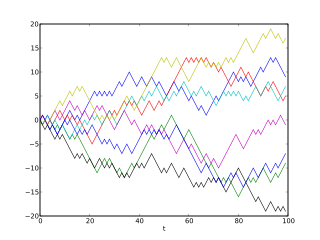Related Research Articles
A hedge fund is a pooled investment fund that holds liquid assets and that makes use of complex trading and risk management techniques to improve investment performance and insulate returns from market risk. Among these portfolio techniques are short selling and the use of leverage and derivative instruments. In the United States, financial regulations require that hedge funds be marketed only to institutional investors and high-net-worth individuals.

Value at risk (VaR) is a measure of the risk of loss of investment/capital. It estimates how much a set of investments might lose, given normal market conditions, in a set time period such as a day. VaR is typically used by firms and regulators in the financial industry to gauge the amount of assets needed to cover possible losses.
Financial engineering is a multidisciplinary field involving financial theory, methods of engineering, tools of mathematics and the practice of programming. It has also been defined as the application of technical methods, especially from mathematical finance and computational finance, in the practice of finance.
Alfred Winslow Jones was an American investor, hedge fund manager, and sociologist. He is credited with forming the first modern hedge fund and is widely regarded as the "father of the hedge fund industry."
Peter Lewyn Bernstein was an American financial historian, economist and educator whose evangelizing of the efficient-market hypothesis to the public made him one of the country's best known popularizers of academic finance.
Financial risk management is the practice of protecting economic value in a firm by managing exposure to financial risk - principally credit risk and market risk, with more specific variants as listed aside - as well as some aspects of operational risk. As for risk management more generally, financial risk management requires identifying the sources of risk, measuring these, and crafting plans to mitigate them. See Finance § Risk management for an overview.
Financial modeling is the task of building an abstract representation of a real world financial situation. This is a mathematical model designed to represent the performance of a financial asset or portfolio of a business, project, or any other investment.

Computational finance is a branch of applied computer science that deals with problems of practical interest in finance. Some slightly different definitions are the study of data and algorithms currently used in finance and the mathematics of computer programs that realize financial models or systems.
Following is a partial list of professional certifications in financial services, with an overview of the educational and continuing requirements for each; see Professional certification § Accountancy, auditing and finance and Category:Professional certification in finance for all articles.
Reuven Brenner is a Romanian-born Israeli-Canadian economics professor, holding the REPAP Chair of Economics at McGill University's Desautels Faculty of Management.

Peter Hart Gregory, CISA, CISSP is an American information security advisor, computer security specialist, and writer. He is the author of several books on computer security and information technology.

Paul Wilmott is an English researcher, consultant and lecturer in quantitative finance. He is best known as the author of various academic and practitioner texts on risk and derivatives, for Wilmott magazine and Wilmott.com, a quantitative finance portal, and for his prescient warnings about the misuse of mathematics in finance.
Wilmott Magazine is a mathematical finance and risk management magazine, combining technical articles with humor pieces. Each copy of Wilmott is 11 inches square, runs about 100 pages, and is printed on glossy paper. The magazine has the highest subscription price of any magazine.

Andrew Wen-Chuan Lo is a Hong Kong-born Taiwanese-American economist and academic who is the Charles E. and Susan T. Harris Professor of Finance at the MIT Sloan School of Management. Lo is the author of many academic articles in finance and financial economics. He founded AlphaSimplex Group in 1999 and served as chairman and chief investment strategist until 2018 when he transitioned to his current role as chairman emeritus and senior advisor.

AQR Capital Management is a global investment management firm based in Greenwich, Connecticut, United States. The firm, which was founded in 1998 by Cliff Asness, David Kabiller, John Liew, and Robert Krail, offers a variety of quantitatively driven alternative and traditional investment vehicles to both institutional clients and financial advisors. The firm is primarily owned by its founders and principals. AQR has additional offices in Boston, Chicago, Los Angeles, Bangalore, Hong Kong, London, Sydney, and Tokyo.

The Quants is the debut New York Times best selling book by Wall Street journalist Scott Patterson. It was released on February 2, 2010 by Crown Business. The book describes the world of quantitative analysis and the various hedge funds that use the technique. Two years later, Patterson published a follow-up book, Dark Pools: High Speed Traders, AI Bandits and the Threat to the Global Financial System, an investigative journey into the history of high-frequency trading and the spread of artificial intelligence in today’s markets.
Clifford Scott Asness is an American hedge fund manager and the co-founder of AQR Capital Management. As of July 2024, Forbes estimated his net worth at US$2.0 billion.
Quantitative analysis is the use of mathematical and statistical methods in finance and investment management. Those working in the field are quantitative analysts (quants). Quants tend to specialize in specific areas which may include derivative structuring or pricing, risk management, investment management and other related finance occupations. The occupation is similar to those in industrial mathematics in other industries. The process usually consists of searching vast databases for patterns, such as correlations among liquid assets or price-movement patterns.
Riccardo Rebonato is Professor of Finance at EDHEC Business School and EDHEC-Risk Institute, Scientific Director of the EDHEC Risk Climate Impact Institute (ERCII), and author of journal articles and books on Mathematical Finance, covering derivatives pricing, risk management, asset allocation and climate change. In 2022 he was granted the PRM Quant of the Year award for 'outstanding contributions to the field of quantitative portfolio theory'. Prior to this, he was Global Head of Rates and FX Analytics at PIMCO.
Global Association of Risk Professionals (GARP) is a not-for-profit organization and a membership association for risk managers. Its services include setting standards, training, education, industry networking, and promoting risk management practices. Founded in 1996 and headquartered in Jersey City, New Jersey, with additional offices in London, Washington, D.C., Beijing, and Hong Kong. GARP offers several foundational and certificate programs, the best known of which is the Financial Risk Manager (FRM) certification.
References
- ↑ Stephen Schurr, Gamblers Profit from Holding a Strong Hand Archived October 19, 2009, at the Wayback Machine , Financial Times, March 20, 2006
- ↑ "GARP - 2011 Risk Manager of the Year: Aaron Brown". Oct 6, 2014. Archived from the original on July 13, 2013. Retrieved Dec 5, 2022.
{{cite web}}: CS1 maint: bot: original URL status unknown (link) - 1 2 2011 Risk Manager of the Year: Aaron Brown, GARP.
- ↑ Adam Leitzes and Joshua Solan, Bulls, Bears and Brains: Investing with the Best and Brightest of the Financial Internet, John Wiley & Sons (2002), ISBN 978-0-471-44294-3
- ↑ David Penn, Aaron Brown: Poker Wizard of Wall Street Archived August 29, 2008, at the Wayback Machine , June 2008
- 1 2 Aaron Brown, The Poker Face of Wall Street, John Wiley & Sons (2006), ISBN 978-0-470-12731-5
- ↑ Risk Magazine, July 2007, page 15 (incl. photo), Incisive Media, ISSN 0952-8776
- ↑ Haug, Espen (2007). Derivative Models on Models. John Wiley & Sons. ISBN 978-0-470-01322-9.
- ↑ Professionals (GARP), The Global Association of Risk. "Global Association of Risk Professionals Presents 2011 Risk Manager of the Year Award at the Opening of its 13th Annual Risk Management Convention in New York City". www.prnewswire.com (Press release). Retrieved Dec 5, 2022.
- 1 2 3 Biography, PRMIA.
- ↑ Brown, Aaron C., Financial Risk Management For Dummies (John Wiley & Sons, 2015), ISBN 978-1-119-08220-0
- ↑ Brown, Aaron C. Red-Blooded Risk: The Secret History of Wall Street John Wiley & Sons (2012)
- ↑ Reuven and Gabrielle Brenner, and Aaron Brown, A World of Chance: Betting on Religion, Games, Wall Street, Cambridge University Press (2008), ISBN 978-0-521-88466-2